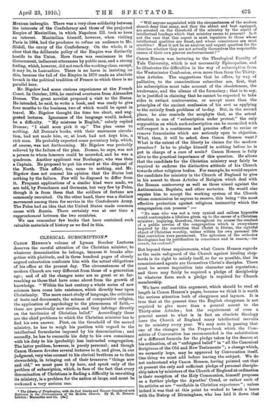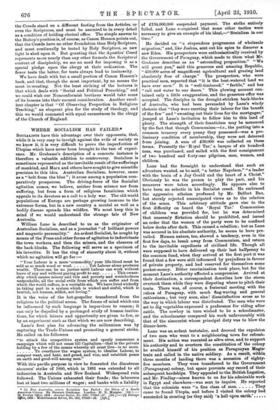CLERICAL SUBSCRIPTION.*
CANON HENSON'S volume of Lyman Beecher Lectures deserves the careful attention of the Christian minister, to whatever denomination he belongs, because it breaks alto- gether with platitude, and in three hundred pages of closely argued exhortation confronts him with the actual obligations of his office at the present day. The circumstances of the modern Church are very different from those of a generation ago ; and of all the changes none are so great or so far- reaching as those that have come about from the growth of knowledge. " Within the last century a whole series of new sciences have come into existence, which directly bear upon Christianity. The more exact study of language, the criticism of texts and documents, the science of comparative religion, the application of psychology to the phenomena of faith,— these are practically new studies, and they infringe directly on the territories of Christian belief." Accordingly these are the chief problems to which the Christian minister has to find his own answer. First, on the threshold of the sacred ministry, he has to weigh his position with regard to the intellectual formularies imposed by his denomination ; and secondly, he has to reconcile his duty to his own conscience with his duty to his (probably) less instructed congregation. The latter problem, however, is purely personal; and though Canon Henson devotes several lectures to it, and gives, in our judgment, very wise counsel to his clerical brethren as to their stewardship, in bringing out of their treasures " things new and old," we must pass it by here, and speak only of the Problem of subscription, which, in face of the fact that every denomination of Christians is finding a difficulty in recruiting its minis' try, is a problem for the nation at large, and must be reckoned a very serious one.
• The Liberty of Prophesying, with its Just Limits and Temper Considered with Reference to the Circumstances of the Modem Church. By H. H. Henson. London i Macmillan and Co. [6a.] " Will anyone acquainted with the circumstances of the modern church deny that many, and they the ablest and best equipped, are arrested on the threshold of the ministry by the aspect of intellectual bondage which that ministry seems to present? Is it not the case that this aspect is most repulsive to those whose intellectual qualities are finest, and whose consciences are most sensitive? Must it not be an anxious and urgent question for the
churches whether they are not act ally themselves the responsible causes of their own gravest embarrassment ?"
Canon Henson was lecturing to the Theological Faculty of Yale University, which is not necessarily Episcopalian, and he illustrates the difficulties in the way of subscription from
the Westminster Confession, even more than from the Thirty- nine Articles. The suggestions that he offers, by way of
palliative, to the conscientious subscriber are, first, that his subscription must take account of the obsoleteness, the irrelevance, and the silence of the formulary ; that is to say, he is justified in claiming that he cannot be expected to take sides in extinct controversies, or accept more than the principles of the ancient confession of his sect as applying to the entirely fresh problems of to-day. But, in the second place, he also reminds the neophyte that, as the actual situation is one of " subscription under protest," the only supposition on which such subscription can be reconciled with self-respect is a continuous and genuine effort to revise or remove formularies which are seriously open to objection. What, then, it will be asked, does Canon Henson want ?
What is the extent of the liberty be claims for the modern preacher ? Is he to pledge himself to nothing before he is put in charge of a cure of souls ? Canon Henson is fully alive to the practical importance of this question. He allows that the candidate for the Christian ministry may fairly be required to endorse the distinctive attitude of his Church towards other religious bodies. For example, he would require the candidate for ministry in the Church of England to give in his assent to those Articles of Religion which deal with the Roman controversy as well as those aimed against the Antinomians, Baptists, and other sectaries. He would also require him to accept the working system of the Church whose commission he aspires to receive, this being " the most effective protection against religious insincerity which the congregation can possess " :—
" No man who was not a very cynical and callous hypocrite could contemplate a lifetime given up to the career of a Christian minister; implying, therefore, throughout its course the conduct of a public service of the congregation which is everywhere inspired by the conviction that Christ is Divine, the rightful object of Christian worship, unless within his own personal life that conviction were paramount. The aphorism of the orthodox theologians has its justification in conscience and in reason,---/ez orandi, lex credendi."
But beyond these requirements, what Canon Henson regards as the main safeguard of the Church against hireling shep- herds is its right to satisfy itself, so far as possible, that its commissioned agents are themselves Christ's disciples. There must be severe inquisition into character and reputation ; and there may fairly be required a pledge of discipleship in whatever form such a pledge is required for Church membership.
We have outlined this argument, which should be read at length in Canon Henson's pages, because we think it is worth the serious attention both of clergymen and laymen. It is true that at the present time the English clergyman is not required to give more than a general assent to the Thirty-nine Articles ; but the requirement of even a general assent to what is in fact an obsolete theology loses the Church of England many intellectual recruits to its ministry every year. We may note in passing that one of the changes in the Prayer-book which the Com- mittee of Convocation has recommended is the substitution of a different formula for the pledge taken by the deacon at his ordination, of an " unfeigned belief " in " all the Canonical Scriptures of the Old and New Testaments "; a change which, we earnestly hope, may be approved by Convocation itself. One thing we must add before leaving the subject. We do not understand why Canon Henson, having pointed out that at present the only and sufficient pledge of personal disciple- ship taken by ministers of the Church of England at ordination is their reception of the Holy Communion, himself proposes as a further pledge the Apostles' Creed, or rather such of its articles as are "verifiable in Christian experience " ; unless indeed it was that at this point he wished to tweak a lance with the Bishop of Birmingham, who has laid it down that the Creeds stand on a different footing from the Articles, or even the Scriptures, and must be assented to in every detail as a condition of holding clerical office. The simple answer to the Bishop's position is, of course, as Canon Henson points out, that the Creeds have no other foundation than Holy Scripture, and must continually be tested by Holy Scripture, as new light is shed upon it. But granting that the Apostles' Creed represents more nearly than any other formula the Scriptural content of discipleship, we see no need for imposing it as a special pledge upon the clergy at their ordination. The fewer tests the better, for tests always lead to insincerity.
We have dealt with but a small portion of Canon Henson's book, and that, though the most important, by no means the most interesting. Not the least striking of the lectures is that which deals with " Social and Political Preaching," and we could wish our Nonconformist brethren would take some of its lessons into their earnest consideration. Another excel- lent chapter is that " Of Observing Proportion in Religious Teaching," an eloquent plea for the study of theology, and this we would commend with equal earnestness to the clergy of the Church of England.















































 Previous page
Previous page